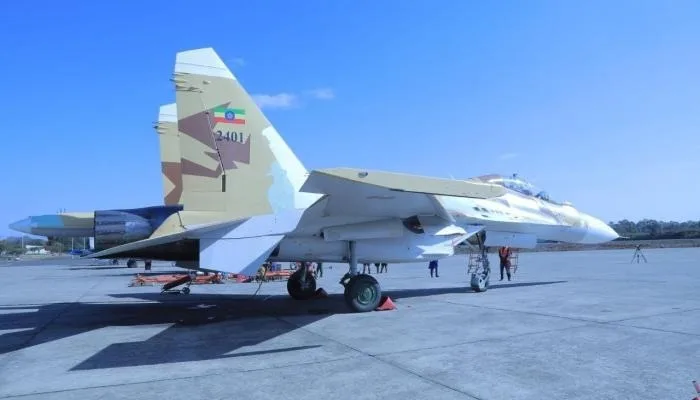In a significant move aimed at enhancing its defense capabilities, the Ethiopian Air Force has recently taken delivery of a fleet of modern Su-30 fighter jets and strategic drones.
The handover ceremony, attended by the Chief of Staff of the Armed Forces, Field Marshal Berhanu Jula, took place in Addis Ababa today.
Field Marshal Jula emphasized the critical role these state-of-the-art Su-30 fighter jets and strategic drones play in safeguarding the nation. He stated, “Our possession of the world’s best Su-30 and strategic drones is crucial to thwarting attacks on our country.”
Highlighting the importance of modernizing the air force, he pointed out that these cutting-edge fighter planes and strategic drones belong to the 5th generation, contributing to the ongoing efforts to upgrade Ethiopia’s air defense capabilities.
The Chief of Staff reiterated the commitment to continue equipping Ethiopian airspace with advanced combat weapons capable of defending against any form of attack.
The Ethiopian Air Force, in its pursuit of enhancing its reputation, combat capabilities, and weaponry in Africa, declared success in the ongoing modernization initiatives.
Lt. Gen. Yilma Merdasa, the Commander-in-Chief of the Ethiopian Air Force, emphasized the strengthening of the Air Force through well-trained personnel, advanced weaponry, and improved combat infrastructure.
He highlighted the capability of the newly acquired modern war jets to simultaneously engage enemy targets in both air and ground operations.
Amid these developments, Ethiopia has found itself embroiled in a diplomatic dispute with Somalia.
The disagreement arose following Ethiopia’s signing of a memorandum of understanding with the self-governing Somaliland three weeks ago, granting access to a sea gate. The agreement allows Ethiopia to lease 20 kilometers of coastline in the Gulf of Aden, with the condition of recognizing Somaliland as a sovereign state.
This diplomatic move has led to discontent in Somalia, which regards Somaliland as part of its sovereign territory.
The international community, including the US, European Union, African Union, China, Arab League, and Egypt, has expressed reservations and stated that they will not support the agreement, citing respect for Somalia’s sovereignty.
In response, the Ethiopian government issued a statement asserting that the agreement does not violate any international laws or infringe upon the sovereignty of any nation.
Ethiopia, a landlocked country since Eritrea gained sovereignty in 1991, continues to explore avenues to secure a sea gate to fulfill the needs of its people. The diplomatic tensions surrounding the agreement underscore the complex geopolitical landscape in the Horn of Africa.
